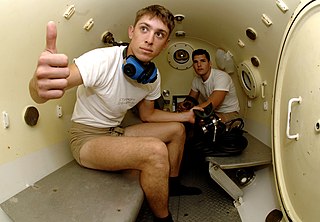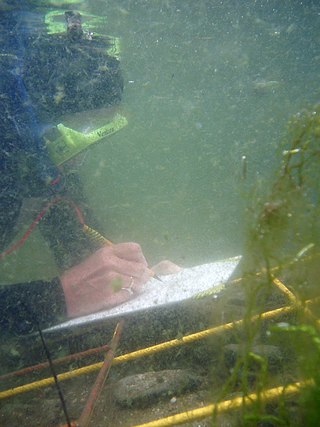A divemaster (DM) is a role that includes organising and leading recreational dives, particularly in a professional capacity, and is a qualification used in many parts of the world in recreational scuba diving for a diver who has supervisory responsibility for a group of divers and as a dive guide. As well as being a generic term, 'Divemaster' is the title of the first professional rating of many training agencies, such as PADI, SSI, SDI, NASE, except NAUI, which rates a NAUI Divemaster under a NAUI Instructor but above a NAUI Assistant Instructor. The divemaster certification is generally equivalent to the requirements of ISO 24801-3 Dive Leader.

Recreational diving or sport diving is diving for the purpose of leisure and enjoyment, usually when using scuba equipment. The term "recreational diving" may also be used in contradistinction to "technical diving", a more demanding aspect of recreational diving which requires more training and experience to develop the competence to reliably manage more complex equipment in the more hazardous conditions associated with the disciplines. Breath-hold diving for recreation also fits into the broader scope of the term, but this article covers the commonly used meaning of scuba diving for recreational purposes, where the diver is not constrained from making a direct near-vertical ascent to the surface at any point during the dive, and risk is considered low.

Professional diving is underwater diving where the divers are paid for their work. The procedures are often regulated by legislation and codes of practice as it is an inherently hazardous occupation and the diver works as a member of a team. Due to the dangerous nature of some professional diving operations, specialized equipment such as an on-site hyperbaric chamber and diver-to-surface communication system is often required by law, and the mode of diving for some applications may be regulated.

Commercial diving may be considered an application of professional diving where the diver engages in underwater work for industrial, construction, engineering, maintenance or other commercial purposes which are similar to work done out of the water, and where the diving is usually secondary to the work.

Diving medicine, also called undersea and hyperbaric medicine (UHB), is the diagnosis, treatment and prevention of conditions caused by humans entering the undersea environment. It includes the effects on the body of pressure on gases, the diagnosis and treatment of conditions caused by marine hazards and how relationships of a diver's fitness to dive affect a diver's safety. Diving medical practitioners are also expected to be competent in the examination of divers and potential divers to determine fitness to dive.

A dive log is a record of the diving history of an underwater diver. The log may either be in a book, locally hosted software, or web based. The log serves purposes both related to safety and personal records. Information in a log may contain the date, time and location, the profile of the dive, equipment used, air usage, above and below water conditions, including temperature, current, wind and waves, general comments, and verification by the buddy, instructor or supervisor.

Scientific diving is the use of underwater diving techniques by scientists to perform work underwater in the direct pursuit of scientific knowledge. The legal definition of scientific diving varies by jurisdiction. Scientific divers are normally qualified scientists first and divers second, who use diving equipment and techniques as their way to get to the location of their fieldwork. The direct observation and manipulation of marine habitats afforded to scuba-equipped scientists have transformed the marine sciences generally, and marine biology and marine chemistry in particular. Underwater archeology and geology are other examples of sciences pursued underwater. Some scientific diving is carried out by universities in support of undergraduate or postgraduate research programs, and government bodies such as the United States Environmental Protection Agency and the UK Environment Agency carry out scientific diving to recover samples of water, marine organisms and sea, lake or riverbed material to examine for signs of pollution.

Commercial offshore diving, sometimes shortened to just offshore diving, generally refers to the branch of commercial diving, with divers working in support of the exploration and production sector of the oil and gas industry in places such as the Gulf of Mexico in the United States, the North Sea in the United Kingdom and Norway, and along the coast of Brazil. The work in this area of the industry includes maintenance of oil platforms and the building of underwater structures. In this context "offshore" implies that the diving work is done outside of national boundaries. Technically it also refers to any diving done in the international offshore waters outside of the territorial waters of a state, where national legislation does not apply. Most commercial offshore diving is in the Exclusive Economic Zone of a state, and much of it is outside the territorial waters. Offshore diving beyond the EEZ does also occur, and is often for scientific purposes.
The Australian Diver Accreditation Scheme (ADAS) is an international commercial and occupational diver certification scheme. It has mutual recognition arrangements with other equivalent national schemes. ADAS qualifications have international recognition.

Diver training is the set of processes through which a person learns the necessary and desirable skills to safely dive underwater within the scope of the diver training standard relevant to the specific training programme. Most diver training follows procedures and schedules laid down in the associated training standard, in a formal training programme, and includes relevant foundational knowledge of the underlying theory, including some basic physics, physiology and environmental information, practical skills training in the selection and safe use of the associated equipment in the specified underwater environment, and assessment of the required skills and knowledge deemed necessary by the certification agency to allow the newly certified diver to dive within the specified range of conditions at an acceptable level of risk. Recognition of prior learning is allowed in some training standards.

A diving instructor is a person who trains and usually also assesses competence of underwater divers. This includes freedivers, recreational divers including the subcategory technical divers, and professional divers which includes military, commercial, public safety and scientific divers.

Dive planning is the process of planning an underwater diving operation. The purpose of dive planning is to increase the probability that a dive will be completed safely and the goals achieved. Some form of planning is done for most underwater dives, but the complexity and detail considered may vary enormously.

Surface supplied diving skills are the skills and procedures required for the safe operation and use of surface-supplied diving equipment. Besides these skills, which may be categorised as standard operating procedures, emergency procedures and rescue procedures, there are the actual working skills required to do the job, and the procedures for safe operation of the work equipment other than diving equipment that may be needed.
Diving safety is the aspect of underwater diving operations and activities concerned with the safety of the participants. The safety of underwater diving depends on four factors: the environment, the equipment, behaviour of the individual diver and performance of the dive team. The underwater environment can impose severe physical and psychological stress on a diver, and is mostly beyond the diver's control. Equipment is used to operate underwater for anything beyond very short periods, and the reliable function of some of the equipment is critical to even short-term survival. Other equipment allows the diver to operate in relative comfort and efficiency, or to remain healthy over the longer term. The performance of the individual diver depends on learned skills, many of which are not intuitive, and the performance of the team depends on competence, communication, attention and common goals.
Diving regulations are the stipulations of the delegated legislation regarding the practice of underwater diving. They apply within the national territory and territorial waters of a country. In most cases they apply to occupational diving, but in a few cases also to recreational diving. There are exemptions for recreational diving in some cases where it is recognised as a self-regulated industry. Offshore diving is generally outside the scope of diving regulations, and tends to be self-regulated through voluntary membership of industry organisations.

A diving team is a group of people who work together to conduct a diving operation. A characteristic of professional diving is the specification for minimum personnel for the diving support team. This typically specifies the minimum number of support team members and their appointed responsibilities in the team based on the circumstances and mode of diving, and the minimum qualifications for specified members of the diving support team. The minimum team requirements may be specified by regulation or code of practice. Some specific appointments within a professional dive team have defined competences and registration may be required.
Commercial divers as defined in the Diving Regulations to the Occupational Health and Safety Act 85 of 1993 are required to be registered with the Department of Employment and Labour. The Department of Employment and Labour has jurisdiction only within the national borders of South Africa, and therefore registered diving schools are required to operate within the borders of South Africa where the Diving Regulations apply. A registered diving school is required to comply with the Code of Practice for Commercial Diver Training, and the training standards published by the department for divers, supervisors and instructors respectively.
A diver training standard is a document issued by a certification, registration regulation or quality assurance agency, that describes the prerequisites for participation, the aim of the training programme, the specific minimum competences that a candidate must display to be assessed as competent, and the minimum required experience that must be recorded before the candidate can be registered or certified at a specific grade by the agency. A standard is a description of the quality required of a product, or a way of doing something that has usually been derived from the experience of experts in a specific field. The purpose is to provide a reliable method for people to share a reasonably consistent expectation regarding the scope and quality of the product or service. Training standards allow objective comparison between the training provided by various agencies and the competence indicated by certification or registration to the specific standard, though in most cases, training and competence may exceed the minimum requirement much of the time, and variation between newly certified divers can be considerable, partly due to differences in the training, and partly due to qualities of the candidate. Training standards may narrowly prescribe the training, or may concentrate on assessment of exit level competence, and allow recognition of prior learning based on various forms of evidence. To be useful, a training standard must be sufficiently specific to allow agreement on the requirements by most readers reasonably competent in the field, including the instructors, assessors, and learners who must use it, the employers of persons trained, the potential customers, and any quality assurance personnel who may need to enforce it. A training standard may be linked to a code of practice referring to how the training should be carried out.
Recreational scuba certification levels are the levels of skill represented by recreational scuba certification. Each certification level is associated with a specific training standard published by the certification agency, and a training programme associated with the standard., though in some cases recognition of prior learning can apply. These levels of skill can be categorised in several ways:











